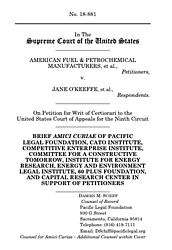Learn more about Cato’s Amicus Briefs Program.
The Commerce Clause was designed not only to give Congress the authority to regulate interstate commerce, but also to ensure that states don’t disrupt the flow of goods and services over state lines. States cannot prefer in-state producers, sellers, or buyers over out-of-state ones, or regulate conduct outside the state. This is a fundamental principle of federalism that prevents states from gaining advantage over others when it comes to trade.
Despite that anti-protectionist mechanism, Oregon enacted its Low Carbon Fuel Standard, which caps emissions not just from the use of fuels, but also from their production and transportation. It uses a methodology called “life cycle analysis” to include these factors. But a life cycle analysis that includes transportation penalizes out-of-state producers—who often have to travel much further than in-state producers—forcing them to buy credits, while allowing Oregon producers to generate credits much more easily.
The U.S. Court of Appeals for the Ninth Circuit upheld an identical California law in Rocky Mountain Farmers Union v. Corey(2013). No doubt Oregon saw Rocky Mountain as a green light to enact its policy, and a Ninth Circuit panel here likewise upheld the Oregon law.
The Supreme Court has repeatedly held that states can discriminate against certain goods based on features of the goods themselves but cannot control out-of-state conduct or merely attempt to help in-state producers at the expense of others. Similarly, states cannot reach into other states to regulate things like greenhouse gas emissions. Life cycle analysis is a legal fiction that permits Oregon to benefit its citizens while penalizing outsiders, and control how other states produce fuel. Like interstate import duties and other trade restrictions, the Oregon law thus undermines constitutional structure.
The stakes here are dire: if states can use regulations to affect the national fuel supply chain, they will no longer be on an even footing with respect to the national economy and interstate commerce. If allowed to stand, this decision will essentially allow states like Oregon and California to start domestic trade wars, over fuel or anything else.
Cato thus joins the Pacific Legal Foundation, Competitive Enterprise Institute, and five other policy organizations in filing an amicus brief supporting fuel manufacturers’ petition for Supreme Court review. We argue that the Oregon law violates the Commerce Clause, as well as Supreme Court precedent, and should be struck down. Federalism requires that no state can be superior to another, nor set the terms of trade for the entire country.

This work is licensed under a Creative Commons Attribution-NonCommercial-ShareAlike 4.0 International License.
